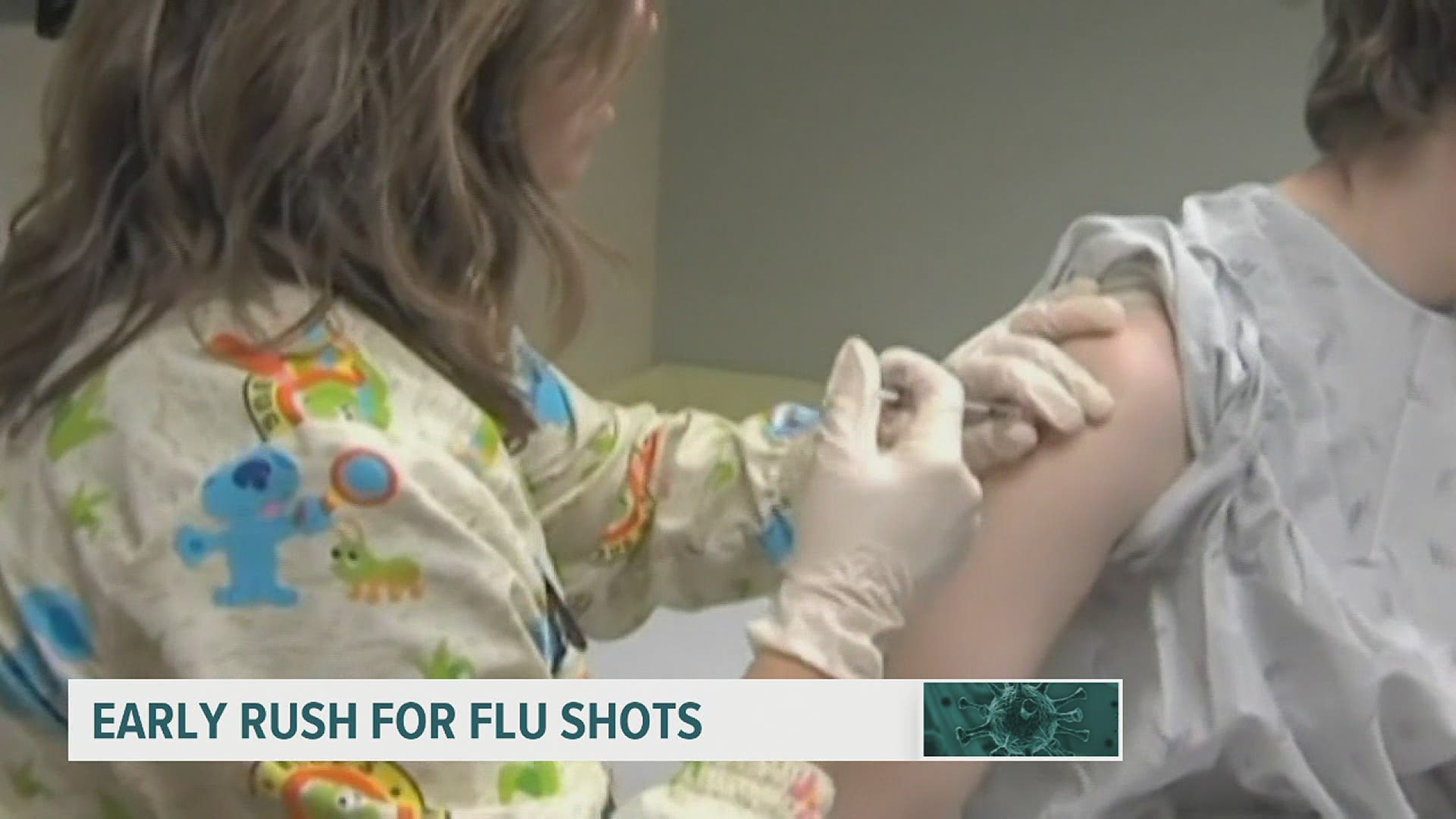The owner of the Medicine Shoppe Pharmacy in York Township admits, he never ran out of flu shots in 2019.
But in 2020, he already has run out of some stock and he's had to order more.
"I knew it was going to be a higher than normal year, but I really didn't anticipate this much interest, said Lynford King, pharmacist and owner of the shop on 1698 S. Queen St.
RELATED: Dept. of Aging reminds older Pennsylvanians to get flu shots, keep other vaccinations up-to-date
King said on Monday he had about 15 regular flu shots left in stock, with more shots expected to arrive next week. As for the flu shots specialized for people 65 and older, he said he has completely run out of those.
"I ran out of them probably two weeks ago. I have more on order but I'm not going to get them until the end of the month," he said.
King said he has administered around 75 shots in the last month and half, nearly double what he would have administered this time last year.
But, he emphasized the early rush is a good thing as people work to keep themselves healthy and out of doctors offices and hospitals during the time of the COVID-19 pandemic. In fact, he said right now is a great time to make sure everyone's immunizations are up to date.
According to a survey commissioned by CVS Health, the impact of COVID-19 is significantly influencing the likelihood of if people will get a flu shot this season. Results of the study have shown that consumers’ intention to get vaccinated has been increasing month over month, with 66 percent of those surveyed in July saying they definitely or likely will get a flu shot this season, compared to 34 percent of those surveyed in January 2020. In addition, 54 percent of consumers surveyed indicated that they plan to get their immunization earlier than last year.
“We know our patients and customers are doing everything they can to keep their families as healthy as possible, while minimizing potential exposure to the flu and COVID-19,” said Jon Roberts, Chief Operating Officer, CVS Health. “Because it can take two weeks for the vaccine to build immunity, we encourage all of our patients to get their shot in September or early October, before flu season peaks.”
"What we really need this year is for more people to get the flu vaccines," echoed Sarah Boateng, Pennsylvania's Executive Deputy Secretary of Health.
With many people working remotely, workplaces can't offer the flu vaccinations as many have done in years past. Therefore, Boateng is reminding everyone to visit their local pharmacy or health clinic to make sure they do get their flu shot, ideally before the end of October.
Since symptoms of the flu and COVID-19 may be similar, Boateng urged everyone who may be feeling sick to contact their health care provider to decide the best steps to get tested for either flu or coronavirus. It is possible to get the flu and COVID-19 at the same time.
Dr. Cindy Whitener of Penn State Health Milton S. Hershey Medical Center admits, however, at this time there is not enough research on the impact having co-infections of the flu and COVID-19 can have on people who become sick.
"It's best for people to get their flu shots so they're not entering into what are semi-uncharted waters right now," she said.
Pennsylvania's Department of Health said seasonal influenza, commonly known as the flu, is a contagious respiratory illness, caused by the influenza virus. It attacks the nose, throat and lungs and may include the following symptoms:
- Fever;
- Headache;
- Tiredness;
- Dry cough;
- Sore throat;
- Nasal congestion; and
- Body aches.
Similarly, COVID-19 symptoms include:
- Fever;
- Cough;
- Shortness of breath;
- Diarrhea;
- Chills;
- Repeated shaking with chills;
- Muscle pain;
- Headache;
- Sore throat; and
- New loss of taste or smell.

